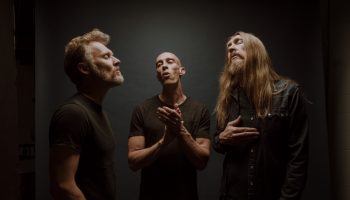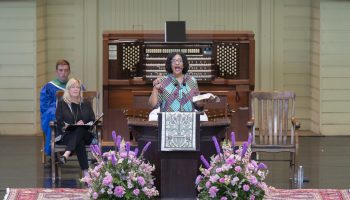If you Google “Should I stay or should I go?,” there are a variety of results, from The Clash’s song of the same name to articles from Psychology Today and Scientific American.
The Apostle Paul wrote to the Philippians that he longed to go to be with Christ, yet knew he needed to “remain in the flesh” for the sake of the church in Philippi.
“Exit or Voice?” was the title of the sermon the Rev. Robert Allan Hill preached at the 9:15 a.m. Tuesday morning worship service. The Scripture reading was Philippians 1:19-26.
Hill recalled a friend who, over a nice pasta dinner on a summer night, was trying to decide whether to stay with a community organization she loved working with or to leave because the new chair was rude and belligerent to the workers. She loved the group and the people she worked with, but when she tried to talk with the chair about his behavior, he rebuffed her. She believed that if she stayed she would be colluding with his behavior, but if she left she would leave people and work that she loved, and she would lose her ability to protect others.
“The hours, days and months are shot through with this dilemma to exit the green garden or listen for the dominical voice of the lord,” Hill said.
As an aside, he noted that the late Peter Gomes, pastor of Harvard Memorial Church at Harvard University for more than 40 years, said that the secret to his success was “ubiquity.” Gomes went everywhere, whether he was invited or not, wanted or not.
“I am ubiquitous,” Gomes said.
In moving toward a common hope, Hill said that the choice to exit or to give voice was a daily one.
Historian Marshall Poe said that American universities are the envy of the world and built and supported by its citizens, but they don’t teach undergraduates how to live.
“We don’t teach students what to do when they feel alone, confused or scared, when they drink too much, go off their meds, get pregnant, get fired, lose their scholarship, a sibling dies, are assaulted or raped, throw up after every meal,” Hill said. “They ask, ‘What do I do next?’ ”
He urged the congregation to send notes to students who are going back to school, to encourage them.
We have to think of human freedom in the light of divine freedom in Christ, as not just free will, but “the freeing of the will.”
“If I were to ask each of you your favorite verse of Scripture, I believe it would show a heavy reliance on Philippians, especially the fourth chapter,” Hill said. “ ‘Rejoice in the Lord always; again I will say, rejoice.’ ”
We are confronted with the daily choice to exit the green garden or listen to the dominical voice of the lord. Hill gave a variety of examples of exit or voice.
If your roommate smokes for breakfast and does drugs for lunch, do you leave the room and even the school, or say to him, “Someone here is crazy and I think it is you,” and talk about the situation?
When you think the faculty has taken a wrong turn with its new curriculum, do you accept the offer from a friend for a position at another school, agitate and criticize in order to be heard or close the door, grade papers and play golf?
“Exit or voice?” Hill asked.
If you are a “cradle Methodist” and the church will not ordain LGBT people, do you exit to a denomination that will ordain people who support LGBT rights, or stay and lift your voice?
“It will be a long, global struggle that will be gritty and will bring prayer and political love together,” Hill said.
If your brother is marrying the wrong woman, if he seems impressionable and she seems like an empress, do you have lunch and talk about it and have a falling out, or send an early gift and bite your tongue?
If you are a major superpower and you have subdued a part of the Middle East, do you leave or do you increase your military presence to bring humans rights to women and children?
If you are an immigrant family and three of you have papers and two of you do not, do you stay and believe what Emma Lazarus wrote, “Give me your, tired, your poor, your hungry…” or do you go north to Montreal, where the Olympic stadium is now open for refugees?
If you are an inner city church in upstate New York and the conference is trying to close you down, do you just take your members down the street to the next church, or do you engage with the committee to show them what your ministry is?
When your “I do” can’t be an “I re-do,” do you exit or give voice?
“How much fight or flight can you manage, and how much can you just play dead for a while?” Hill asked.
Paul, in his letter to the Philippians, had hoped for an immediate translation to glory with Christ, but he knew there was trouble in the church and he might have a good influence on them.
“There is a spiritual balance in the cure of the soul for every age,” Hill said. “How much reformation and how much counter-reformation, how much pulpit and how much table, how much new world, how much old world. One size does not fit all.”
He offered four understandings for finding that balance. First, in choosing exit or voice, exit can become voice, a swan song, and voice can become exit, as found in the Hebrew prophets.
Second, most decisions are an admixture of voice and exit, not one or the other. Third, where you stand physically matters, so show up for church on Sunday. Fourth, whatever voice you lift, it has to make a difference; it has to influence others.
“It is better to press on with big steps rather than small steps, but it is better to take small steps than no steps, and it is better to take no steps than to step backward,” Hill said.
He quoted former United Nations Secretary-General Dag Hammarskjöld, who said: “God does not die on the day when we cease to believe in a personal deity, but we die on the day when our lives cease to be illumined by the steady radiance, renewed daily, of a wonder, the source of which is beyond all reason.”
“Exit or voice; you be the judge,” Hill said. “It’s up to you.”
The Rev. Carmen Perry presided. Linda Stutz read the Scripture. She is spending her 31st summer at Chautauqua and is a member of the Motet Choir, Knitting4Peace, CLSC Class of 2006 and Guild of the Seven Seals. Off-season in Westerville, Ohio, Stutz teaches English as a second language to new Americans, mostly from Somalia. The Motet Choir sang “O God of All People,” by Michael Burkhardt. Jared Jacobsen, organist and coordinator of worship and sacred music, directed the choir. Gary and Willow Brost provide support for this week’s services.





